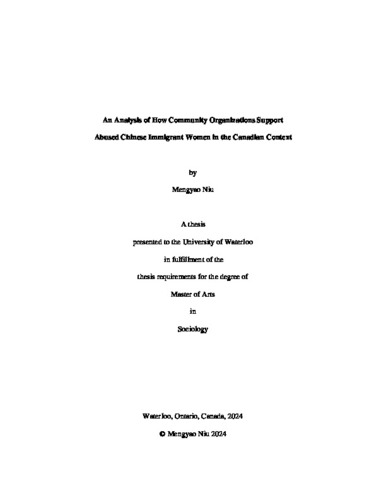| dc.description.abstract | This thesis explores the assistance provided by community organizations in the Kitchener-Waterloo, Toronto, and Vancouver regions to Chinese immigrant women who are victims of domestic violence. Guided by postcolonial feminist insights and through interviews with community service providers, this study examines how the service providers define the needs of these women. In addition, it explores how they act with cultural sensitivity and acknowledge the distinct experiences of racialized immigrant women, while challenging orientalist narratives about ‘minority cultures’ causing domestic violence. My findings reveal the complexity and contradiction in how service providers conceptualize and respond to the women’s needs. Specifically, they blame ‘Chinese culture’ and the ‘women’s foreignness’ for their victimization and reluctance to seek support. They strive to inculcate a ‘non-culturalized’ way of thinking, despite knowing the multidimensional barriers and complex immigrant reality that shape the women’s actions. At the same time, this understanding encourages them to offer additional support, addressing the women’s immigrant- and cultural-specific needs. While doing so, they strategize to reduce the impact of structural constraints on women with limited resources. Their objective is to mitigate the system’s harm and women’s vulnerabilities. However, their understanding of ‘immigrant realities’ is not always accurate. This inadequacy is reflected by their assumption that financial empowerment approaches would also help immigrants. By analyzing the logic of these support services and what they entail, this study reveals a grassroots anti-violence approach that is culturally sensitive and informed by understandings of immigrant women’s distinct experiences, even though this approach can prove insufficient. At the same time, my findings indicate that the practices of anti-violence workers are both informed by and reproduce orientalist, hegemonic assumptions about abused immigrant women. | en |

